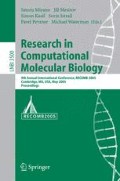Abstract
One of the simplest evolutionary models has molecular sequences evolving from a common ancestor down a bifurcating phylogenetic tree, experiencing point-mutations along the way. However, empirical analyses of different genes indicate that the evolution of genomes is often more complex than can be represented by such a model. Thus, the following problem is of significant interest in molecular evolution: Given a set of molecular sequences, compute a reticulate network that explains the data using a minimal number of reticulations. This paper makes four contributions toward solving this problem. First, it shows that there exists a one-to-one correspondence between the tangles in a reticulate network, the connected components of the associated incompatibility graph and the netted components of the associated splits graph. Second, it provides an algorithm that computes a most parsimonious reticulate network in polynomial time, if the reticulations contained in any tangle have a certain overlapping property, and if the number of reticulations contained in any given tangle is bounded by a constant. Third, an algorithm for drawing reticulate networks is described and a robust and flexible implementation of the algorithms is provided. Fourth, the paper presents a statistical test for distinguishing between reticulations due to hybridization, and ones due to other events such as lineage sorting or tree-estimation error.
Access this chapter
Tax calculation will be finalised at checkout
Purchases are for personal use only
Preview
Unable to display preview. Download preview PDF.
References
Holland, B., Huber, K., Moulton, V., Lockhart, P.J.: Using consensus networks to visualize contradictory evidence for species phylogeny. Molecular Biology and Evolution 21, 1459–1461 (2004)
Rieseberg, L.H., Raymond, O., Rosenthal, D.M., Lai, Z., Livingstone, K., Nakazato, T., Durphy, J.L., Schwarzbach, A.E., Donovan, L.A., Lexer, C.: Major ecological transitions in annual sunflowers facilitated by hybridization. Science 301, 1211–1216 (2003)
Hein, J.: Reconstructing evolution of sequences subject to recombination using parsimony. Math. Biosci., 185–200 (1990)
Hein, J.: A heuristic method to reconstruct the history of sequences subject to recombination. J. Mol. Evol. 36, 396–405 (1993)
Wang, L., Zhang, K., Zhang, L.: Perfect phylogenetic networks with recombination. Journal of Computational Biology 8, 69–78 (2001)
Gusfield, D., Eddhu, S., Langley, C.: Efficient reconstruction of phylgenetic networks with constrained recombination. In: Proceedings of the 2003 IEEE CSB Bioinformatics Conference (2003)
Gusfield, D., Eddhu, S., Langley, C.: The fine structure of galls in phylogenetic networks. INFORMS J. of Computing Special Issue on Computational Biology (2004) (to appear)
Nakhleh, L., Warnow, T., Linder, C.R.: Reconstructing reticulate evolution in species - theory and practice. In: RECOMB 2004, pp. 337–346 (2004)
Hudson, R.R., Kaplan, N.L.: Statistical properties of the number of recombination events in the history of a sample of DNA sequences. Genetics 111, 147–164 (1985)
Myers, S.R., Griffiths, R.C.: Bounds on the minimal number of recombination events in a sample history. Genetics 163, 375–394 (2003)
Bafna, V., Bansal, V.: The number of recombination events in a sample history: conflict graph and lower bounds. IEEE/ACM Transactions in Computational Biology and Bioinformatics 1, 78–90 (2004)
Bandelt, H.J., Dress, A.W.M.: A canonical decomposition theory for metrics on a finite set. Advances in Mathematics 92, 47–105 (1992)
Dress, A.W.M., Huson, D.H.: Constructing splits graphs. IEEE/ACM Transactions in Computational Biology and Bioinformatics 1, 109–115 (2004)
Gusfield, D., Bansal, V.: A fundamental decomposition theory for phylogenetic networks and incompatible characters. To appear in: Proceedings of RECOMB 2005 (2004)
Huson, D.H., Bryant, D.: Estimating phylogenetic trees and networks using SplitsTree 4. Manuscript in preparation (2004), software available from http://www-ab.informatik.uni-tuebingen.de/software
Lockhart, P.J., McLenachan, P.A., Havell, D., Glenny, D., Huson, D.H., Jensen, U.: Phylogeny, dispersal and radiation of New Zealand alpine buttercups: molecular evidence under split decomposition. Ann. Missouri. Bot. Gard. 88, 458–477 (2001)
Kreitman, M.: Nucleotide polymorphism at the alcohol dehydrogenase locus of Drosophila melanogaster. Genetics 11, 147–164 (1985)
Semple, C., Steel, M.A.: Phylogenetics. Oxford University Press, Oxford (2003)
Jukes, T.H., Cantor, C.R.: Evolution of protein molecules. In: Munro, H.N. (ed.) Mammalian Protein Metabolism, pp. 21–132. Academic Press, London (1969)
Maddison, W.P.: Gene trees in species trees. Syst. Biol. 46, 523–536 (1997)
Baroni, M., Semple, C., Steel, M.A.: A framework for representing reticulate evolution. Annals of Combinatorics (in press)
Huson, D.H., Dezulian, T., Kloepper, T., Steel, M.A.: Phylogenetic super-networks from partial trees. IEEE/ACM Transactions in Computational Biology and Bioinformatics (2004) (in press)
Rosenberg, N.A.: The probability of topological concordance of gene trees and species trees. Theor. Pop. Biol. 61, 225–247 (2002)
Sang, T., Zhong, Y.: Testing hybrization hypotheses based on incongruent gene trees. System. Biol. 49, 422–424 (2000)
Steel, M.A., Lockhart, P., Penny, D.: Confidence in evolutionary trees from biological sequence data. Nature 364, 440–442 (1993)
Tajima, F.: Evolutionary relationships of DNA sequences in finite populations. Genetics 105, 437–460 (1983)
Alon, N., Spencer, J.H.: The Probabilistic Method, 2nd edn. John Wiley, Chichester (2000)
Author information
Authors and Affiliations
Editor information
Editors and Affiliations
Rights and permissions
Copyright information
© 2005 Springer-Verlag Berlin Heidelberg
About this paper
Cite this paper
Huson, D.H., Klöpper, T., Lockhart, P.J., Steel, M.A. (2005). Reconstruction of Reticulate Networks from Gene Trees. In: Miyano, S., Mesirov, J., Kasif, S., Istrail, S., Pevzner, P.A., Waterman, M. (eds) Research in Computational Molecular Biology. RECOMB 2005. Lecture Notes in Computer Science(), vol 3500. Springer, Berlin, Heidelberg. https://doi.org/10.1007/11415770_18
Download citation
DOI: https://doi.org/10.1007/11415770_18
Publisher Name: Springer, Berlin, Heidelberg
Print ISBN: 978-3-540-25866-7
Online ISBN: 978-3-540-31950-4
eBook Packages: Computer ScienceComputer Science (R0)

